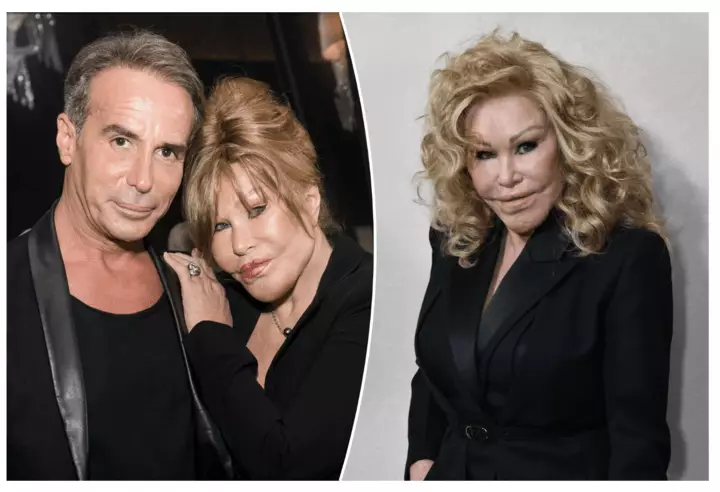Jocelyn Wildenstein, flamboyantly known as “Catwoman,” was a New Yorker at the heart of a saga blending glamor, tragedy, and a life shadowed by public scrutiny. Her recent passing has sparked a renewed dialogue surrounding her life, character, and the stark realities she faced behind the headlines. As narratives unfold through recollections from her fiancée, Lloyd Klein, it becomes evident that Wildenstein’s story transcends the superficial caricature created by the media.
Jocelyn’s life, particularly her tumultuous marriage to billionaire Alec Wildenstein and their highly publicized divorce, set the stage for public fascination and derision. While she may have gained notoriety for her extensive cosmetic surgeries, often described by critics as transforming her into a feline figure, Wildenstein’s narrative reveals layers of complexity. Klein, who was by her side for over two decades, passionately defends her character, asserting that she was extraordinary and vibrant, a stark contrast to the derogatory labels often affixed to her.
Contrary to misconceptions about her financial status upon her death, Klein emphasized that Wildenstein was not destitute. Reports that she faced bankruptcy and had been cut off financially by her ex-husband’s family were stark reminders of the shifting fortunes that accompanied her divorce settlement. Despite receiving a sizable payout of $2.5 billion in 1999, the subsequent years saw her embroiled in legal battles that ravaged her assets. It’s a narrative that highlights the often-hidden realities of wealth, where significant monetary figures are undermined by entitlement issues and legal complexities.
Wildenstein’s life was characterized not only by wealth but also by resilience. Married at 21, she rose from humble beginnings in Switzerland to navigate the elite circles of art and society in New York and Paris. The collapse of her marriage and the ensuing media circus following Alec Wildenstein’s infidelities thrust her into the spotlight. Despite the public spectacle, Klein recounts her strength during those tumultuous times, underscoring her undying commitment to her children.
The divorce from Alec Wildenstein was not easy; it introduced intense scrutiny that dissected every aspect of her world. Wildenstein inherited not only wealth but the accompanying baggage of marital betrayal and public mockery. Klein’s poignant reflections reveal a woman grappling with identity in a world that reduced her to superficial judgments, rather than recognizing her as a mother and an individual with dreams and desires.
The juxtaposition of Jocelyn Wildenstein’s perceived wealth and actual financial situations paints a harrowing image of her later years. Despite having millions in assets, her statement of having “zero” dollars in her checking account raises critical conversations about the realities of financial independence. Wildenstein’s claim that her riches became ensnared by unfortunate circumstances including a forgery scandal only adds to the complexities surrounding her monetary legacy.
Amidst the turmoil and controversy, Klein paints a picture of Wildenstein’s efforts to maintain a lavish lifestyle. His accounts indicate that, despite adversity, Jocelyn took pride in balancing her wealth with a vision of normalcy, often spoiling her children and enriching their lives. Yet, the tragic irony of her situation lies in the fact that as she navigated high society, personal crises continued to unfold with relentless scrutiny from the public eye.
Wildenstein’s quest for beauty, often met with mockery and disdain, encapsulates larger societal conversations about plastic surgery, self-image, and external validation. In many ways, her journey reflects the struggles faced by many women in today’s society, where standards of beauty are rigid and frequently unrealistic. While Klein asserts that Wildenstein never aspired to resemble a cat, her unique appearance became emblematic of a broader conversation surrounding body autonomy and the consequences of societal roles.
Despite the barrage of criticisms, Klein remembers Wildenstein’s laughter and humor when confronted with unkind nicknames like “Catwoman.” This approach not only humanizes her but highlights a fundamental truth: beneath every public persona lies a person worthy of dignity and respect. Klein’s desire is for the world to remember Wildenstein for a life adorned with love and laughter rather than the caricature created by media narratives.
In reflecting upon Jocelyn Wildenstein’s life, it becomes apparent that her journey spanned themes of love, loss, and the undeniable influence of societal perceptions. As her loved ones, including Klein, step forward to ensure her dignity in death, the importance of viewing her legacy through a compassionate lens becomes ever clearer. It is a call to not only honor the complexities of her life but also to recognize the lessons her story has to offer in an era marked by a quest for outer beauty over inner strength. In the end, as Klein prepares to honor her memory, he wishes to celebrate the woman who championed her desires through the trials imposed by both society and fate.

